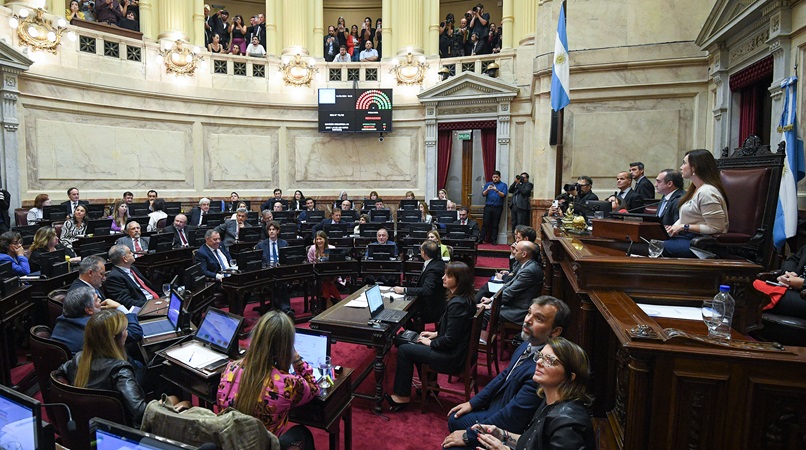
The DNU was rejected in the Senate and became the second major political defeat of the Milei Government. Once again about the relationship between economics and politics. Editorial of “El Círculo Rojo”, a program on La Izquierda Diario that broadcasts on Thursdays from 10 p.m. to midnight on Radio Con Vos, 89.9.
- The mega Decree of Necessity and Urgency was resoundingly rejected in the Senate this Thursday afternoon (42 votes against and 25 votes in favor). It is the second major political defeat suffered by the Government of Javier Milei at the hands of Congress (the previous one was the fall of the “Omnibus Law” in Deputies). To these major defeats, we must add other adverse resolutions that do not have the same relevance, but are important, such as the judicial resolutions that blocked the labor reform chapter of the DNU or others that suspended the increases authorized by the Government for prepaid medicine. .
See this post on Instagram
- I think that this defeat allows us to have a more balanced vision of the political scenario in which everything is open and we are far from an unbeatable Milei that – due to the fact of occupying political centrality by dint of tweeting about it all day – gave the image of advancing unhindered.
- Because in the public debate it seemed that we were witnessing a kind of deja vu in relation to the discussions about the political consistency of the Government and the libertarian project. At least to me it gives me the sensation of hearing an echo of statements that were heard at the beginning of various government experiences in recent times.
- I remember that in the first years of Mauricio Macri’s Government and the original Cambiemos (we are talking about 2015, 2016 until 2017) interpretations circulated that said more or less this: Macri managed to disconnect politics from the economy because people support him despite that he is undergoing an adjustment and (especially in 2017 when he won the legislative elections) they vote for him for other reasons, because he won a “cultural battle” or because he managed to change the nature of politics through controlling what people think with the use of big data, the new wisdom of the algorithm and communication through social networks. Marcos Peña (remember Marcos Peña?), Macri’s former chief of staff, was the brain of this great transformation, the strategist who had managed to turn Macri into a great statesman of the 21st century.
- If one looked closely at the underlying reasons why Macri had triumphed in 2017, one found that the economy had been very important, that he had had a policy that some described as “financial populism”, he had injected money into the economy, 2017 was the only year in which the real salary did not fall etc. But, well, some preferred to think that Macri had imposed a “new hegemony” of an ideological or “cultural” type in the broadest sense and that went beyond the economy. We already know how the story ended: December 2017 days against the pension reform that demonstrated the impossibility of applying Macri’s counter-reform plan, market revolt throughout 2018, agonizing rescue request to the IMF and collapse of the Government that did not fall — This must be said—because they supported it from the outside, they gave it governability to “make it reach” until the electoral change.
- Similar interpretations are heard in front of the Milei Government. It is no longer said that “the economy does not matter”, but rather that, despite the adjustment, it is ignored and will continue to be approved for a long time. Because, in addition, they also “won the communication battle” and they have a well-oiled management of the networks, in this case for their digital guerrilla wars in which they turn enemies around as they say. The “Marcos Peña” of this political project is Santiago Caputo or if you want, the role that Marcos Peña concentrated on today is divided into two people, the young Caputo as network strategist and Karina Milei as the big brain, the black monk behind all the President’s moves.
- Let’s see, both then and now, these looks contained and contain kernels of truth. The “new right” that was born with Macri had appropriated the old radical electorate (of the UCR), had penetrated certain popular sectors (María Eugenia Vidal governed the province of Buenos Aires) and had convinced (in the face of the failure and inconsistencies of “progressive” or “popular national” experiences) to a sector of the population with certain values linked to the universe of ideas of the right.
- In the case of Milei, he radicalized part of that electorate (due to the failure of the Macri Government) and absorbed it. But, in addition, there is a political factor that plays in this situation (almost 100 days into the administration). The consulting firm Escenarios (directed by Federico Zapata and Pablo Touzon) asked in a recent survey about several topics (about the fall of the Omnibus Law, about the crisis with the governors) and in the majority of the answers the Government was held responsible for the failures. (for being intransigent, because the provinces are right, etc.) Now, when they asked “Who do you think is responsible for the current economic situation?”, the answer was categorical: the crisis continues to be charged to the account of the Frente de Todos.
- In other words, the handicap that Milei has until now continues to be “negative partisanship” due to the rejection of previous recipes that led the country to a chronic crisis. Now this factor is very weak and precarious, it will change over time due to the lack of program results that are inconsistent no matter how you look at it.
- That is why these readings are wrong in two issues: taking those real elements and giving them unlimited value and considering that they can become absolutely independent of the economy, that is, of the tangible results of Milei’s economic program.
- The governors are aware of this (they say that the adjustment is necessary, but let the other do it because they know it can have serious consequences) and also the senators who respond to them. They are aware that it is a weak government, whose foundations are very precarious and whose economic program is unsustainable over time. Let’s see, if it were a strong government (even like Macri when he started) everyone would be subordinated without problems.
- Be careful, they are not the only ones who see this: the Pope saw it when he made a political gesture receiving Milei, Rosatti (Minister of the Court) knows it when he marks the field, Victoria Villarruel knows it, who began her conspiratorial moves (among them enable this session) and even the IMF knows it, demanding that it seek political sustainability for the adjustment and the economic program and is monitoring it every day to see if it achieves it. That the most aristocratic chamber (the Senate) votes against the Government in this way would not be a signal in that sense.
- In its own way, the CGT also knows this, which is why it measures the confrontation because a forceful measure would put this government in a serious crisis.
- What is proposed is that of this reality, the great majorities become aware that they can impose a plan of struggle that could tip the balance, impose that the DNU in Deputies also be rejected (which would imply its fall) and that it could end with the nightmare of this wild setting.
Photo: Senate Communication
Politics / Senate / Javier Milei / The Red Circle
Source: www.laizquierdadiario.com

